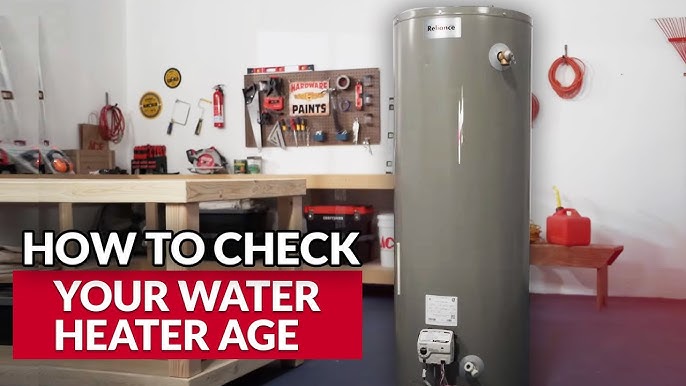To determine the age of a Reliance water heater, check for a manufacturer label on the side of the unit that includes the installation date. If the label is missing or the installation date is not listed, you can use the serial number to determine the age of the water heater.
The first letter of the serial number represents the month of manufacture, and the first two numbers represent the year. Reliance water heaters are a popular choice for homeowners looking to provide hot water for their daily needs. However, it is important to know the age of your water heater in order to assess its condition and determine if it may be nearing the end of its lifespan.
We will explore how you can determine the age of your Reliance water heater using the installation label or the serial number. By knowing the age of your water heater, you can make informed decisions about maintenance, repairs, or potential replacements.
Reliance Water Heater Age Unveiled
Discover the age of your Reliance water heater in Austin, Texas, United States. Find out the installation date by checking the manufacturer label or using the serial number.
Clues Embedded Within Your Heater
One of the first steps in determining the age of your Reliance water heater is to check for clues embedded within the unit itself. Start by inspecting the manufacturer label on the side of your water heater. This label often includes the installation date, which can give you a rough estimate of how long the unit has been in service. However, if the label is missing or the installation date is not listed, don’t worry. There is another way to determine the age of your water heater.
Deciphering The Manufacturer’s Code
If the manufacturer label is not providing the information you need, you can turn to the serial number of your Reliance water heater for clues about its age. The serial number contains hidden information that can be decoded to reveal the manufacturing date. By understanding the format of the serial number and how the different digits correspond to specific dates, you can easily determine when your water heater was manufactured.
Here is an example of how a typical Reliance water heater serial number might look:
| Serial Number Format | Manufacturing Date |
|---|---|
| XX0000XXXX | Deciphering the code |
Each digit in the serial number represents a specific piece of information about the water heater, such as the year and month of manufacture. By referencing a reliable decoding chart or contacting the manufacturer directly, you can easily determine the exact age of your Reliance water heater using the serial number.
Importance Of Knowing Your Water Heater’s Age
Knowing the age of your Reliance water heater is crucial for several reasons. Firstly, it allows you to estimate the remaining lifespan of the unit. Water heaters typically have a lifespan of around 8-12 years, so if your unit is approaching or surpassing this age range, it may be time to consider a replacement to avoid unexpected failures or leaks.
Additionally, understanding the age of your water heater can help you make informed decisions regarding maintenance and repairs. Older units may require more frequent servicing or could benefit from proactive upgrades to improve energy efficiency. By being aware of your water heater’s age, you can anticipate potential issues and take appropriate action to ensure the unit continues to function optimally.
In conclusion, deciphering the age of your Reliance water heater is essential for maintaining its longevity and optimizing its performance. By checking for clues embedded within your heater and understanding how to decode the manufacturer’s code hidden within the serial number, you can easily determine the age of your unit. This knowledge empowers you to make informed decisions regarding maintenance, repairs, and potential replacements, ensuring your water heater continues to provide reliable hot water for years to come.
Crack The Serial Code Secret
When it comes to determining the age of your Reliance water heater, one of the key pieces of information you need is the serial number. The serial number is the primary key that holds the secret to unlocking the age of your water heater. In this section, we will dive into the location of the serial number, the syntax of Reliance serial numbers, and how to use them to determine the age of your unit.
Serial Number: The Primary Key
The serial number of your Reliance water heater is a unique identifier that holds vital information about the age of your unit. It is an alphanumeric code that is typically located on a manufacturer label on the side of the water heater. This serial number is essential for determining the age as it follows a specific syntax that provides valuable insights into the manufacture and installation date of your water heater.
Location Of The Serial Number
To crack the serial code and unveil the age of your Reliance water heater, you need to locate the serial number. It is usually displayed on a label attached to the side of the water heater. Look for a manufacturer label that contains important information about your unit, such as the model number, serial number, and installation date. The serial number should be clearly visible, and it is usually a combination of letters and numbers.
The Syntax Of Reliance Serial Numbers
Reliance water heater serial numbers follow a specific syntax that provides insights into the age of the unit. It typically consists of a combination of letters and numbers that represent various information, such as the year and month of manufacture. The format may vary slightly depending on the specific model and series of your water heater.
Here is an example of how a Reliance serial number may look:
| Serial Number Format | Year of Manufacture | Month of Manufacture |
|---|---|---|
| AB123456789 | AB | 123456789 |
In this example, the first two characters “AB” represent the year of manufacture, while the remaining characters “123456789” indicate the month of manufacture. By understanding the syntax of the serial number, you can decode it and determine the age of your Reliance water heater accurately.
In conclusion, the serial number is the primary key that holds the secret to determining the age of your Reliance water heater. By locating the serial number and understanding its syntax, you can crack the code and unveil the manufacture and installation date of your unit. Knowing the age of your water heater is crucial for maintenance, repair, and replacement purposes.
Manufacturing Date Decoded
Knowing the manufacturing date of your Reliance water heater is crucial when it comes to understanding the age and potential lifespan of your unit. Determining the manufacturing date can help you plan for maintenance or replacement to ensure your water heater continues to provide reliable hot water.
Interpretation Of The Code
The manufacturing date of your Reliance water heater can be determined using the alpha-numeric sequence indicated on the unit. This code provides valuable information about when the unit was manufactured. By decoding the code, you can easily find out how long your water heater has been in operation.
Understanding The Alpha-numeric Sequence
The alpha-numeric sequence typically consists of a combination of letters and numbers. While the specific format may vary slightly depending on the model and year of production, the general structure remains the same.
For example, a common code format may look like this: XYZ123456789.
Here, the letters represent the month and year of manufacture. The first letter corresponds to the month, with A being January, B being February, and so on. The second and third letters indicate the year of manufacture, with Y representing the year 2000, Z representing 2001, and so on.
The following digits after the letters indicate the production sequence number of the unit.
Differences In New Vs. Older Models
It’s important to note that the code structure and format may differ between newer and older models of Reliance water heaters. While newer models may have a more standardized code format, older models may use a different coding system.
If you are unable to decode the code on your older Reliance water heater, it is recommended to contact the manufacturer directly for assistance in determining the manufacturing date.
By understanding the manufacturing date of your Reliance water heater, you can have a better idea of its age, potential lifespan, and any necessary maintenance or replacement requirements. This knowledge can help you make informed decisions to ensure the ongoing reliability and efficiency of your water heating system.
Signs Of Aging In Water Heaters
Determining the age of a Reliance water heater is easy. Simply check the label on the side of the unit for the installation date. If the label is missing, you can use the serial number to determine the age of your water heater.
As water heaters age, they may start to show signs of wear and tear. These signs can indicate a decrease in performance and efficiency, and may even lead to potential problems or breakdowns. It’s important to be aware of these signs so that you can take necessary actions to ensure your water heater continues to function optimally.
Performance: Efficiency And Heating Speed
One of the first indicators of aging in a water heater is a decrease in performance. Over time, sediment can build up at the bottom of the tank, causing your water heater to work harder to heat the water. This can result in decreased efficiency, leading to higher energy bills. Additionally, as the heating elements age, they may become less effective at heating the water, resulting in longer heating times and less hot water availability.
If you notice that your water heater is taking longer to heat up water or if you’re experiencing a decrease in hot water supply, it may be a sign that your water heater is nearing the end of its lifespan. It’s a good idea to have a professional inspect your water heater to assess its condition and determine if it’s time for a replacement.
Physical Indicators Of Water Heater Age
Another way to determine the age of your water heater is by examining its physical condition. As water heaters age, they may develop visible signs of wear and aging. Here are a few physical indicators to look out for:
- Rust or Corrosion: Rust or corrosion on the tank or pipes can be a sign that your water heater is reaching the end of its lifespan. Check for any visible signs of rust or corrosion on the exterior of the tank or around the connections.
- Leaking: If you notice water pooling around the base of your water heater, it could be a sign of a leak. Leaks can occur as a result of deteriorating tank or valve seals, which can happen over time as the water heater ages.
- Cracks or Damage: Inspect the tank for any visible cracks or damage. Over time, the tank can weaken and develop cracks, which can lead to leaks or even tank failure.
If you notice any of these physical indicators, it’s important to have your water heater assessed by a professional. They can determine if the issues can be addressed with repairs or if a replacement is necessary to ensure your continued access to hot water.
Noises: What They Can Tell
As water heaters age, they may start to make unusual noises. These noises can indicate potential problems or issues with the unit. Here are a few common noises and what they may mean:
- Popping or Cracking Sounds: These sounds are typically caused by the buildup of sediment at the bottom of the tank. As the water heats up, it can cause the sediment to shift and create popping or cracking noises.
- Hissing or Sizzling Sounds: Hissing or sizzling sounds may indicate a leak or a faulty valve. It’s important to address these sounds promptly to prevent further damage or potential flooding.
- Booming or Knocking Sounds: Booming or knocking sounds can be a sign of a more serious issue, such as an excessive buildup of sediment or a faulty heating element. These sounds should be investigated by a professional to prevent potential damage to the water heater.
If you notice any unusual noises coming from your water heater, it’s recommended to have it inspected by a professional plumber. They can diagnose the issue and provide the necessary repairs or replacements to ensure your water heater continues to operate safely and efficiently.
Extend Your Heater’s Lifespan
Determining the age of your Reliance water heater is essential for ensuring its optimal performance and longevity. Check for a manufacturer label on the side of your unit or use the serial number to find out the installation date. Extend your heater’s lifespan by staying informed about its age.
Regular Maintenance Tips
Regular maintenance is vital for extending the lifespan of your Reliance water heater. Here are some essential maintenance tips to keep your heater running efficiently:- Drain and flush your water heater annually: Over time, sediment and minerals can build up inside your water heater, reducing its efficiency. You can prevent this by draining and flushing your heater at least once a year. This process will remove any debris and keep your heater functioning optimally.
- Check the pressure relief valve: The pressure relief valve is an important safety feature of your water heater. It releases excess pressure to prevent the tank from exploding. To ensure its proper functioning, periodically test the valve by lifting the lever and allowing water to flow through. If the valve doesn’t release any water or if it’s leaking, it may need to be replaced.
- Inspect the sacrificial anode rod: The anode rod protects the tank from corrosion by attracting corrosive particles. However, over time, the anode rod can become depleted and ineffective. Regularly inspect the rod and replace it if it’s significantly corroded.
- Keep the area around the heater clear: Make sure there is no clutter or debris around your water heater. This will allow for proper ventilation and prevent overheating. Additionally, ensure that there are no flammable materials near the heater to reduce the risk of fire.
When To Call A Professional
While regular maintenance can help prolong the life of your Reliance water heater, there are situations where it’s best to call a professional. These include:- If you notice any leaks: Leaks can be a sign of a failing heating element or a cracked tank. It’s crucial to have a professional inspect and repair the issue to prevent further damage or potential flooding.
- If you experience inconsistent hot water: Inconsistent hot water temperature can indicate a faulty thermostat or heating element. A professional can diagnose and fix the problem, ensuring your water heater operates efficiently.
- If you hear unusual noises: Strange noises coming from your water heater, such as banging or rumbling, could indicate a buildup of sediment or a failing heating element. It’s best to have a professional assess the issue and make any necessary repairs.
Upgrade Advice For Energy Efficiency
Upgrading your water heater to a more energy-efficient model can not only save you money on energy bills but also extend its lifespan. Here are some upgrade tips to consider:- Switch to a tankless water heater: Tankless water heaters heat water on-demand, eliminating the need for a storage tank and reducing energy consumption. They also have a longer lifespan compared to traditional water heaters.
- Consider a high-efficiency model: Look for water heaters with a high energy efficiency rating. These models are designed to maximize heat transfer and minimize energy wastage.
- Insulate your water heater: Adding insulation to your water heater can help retain heat, reducing the workload on the heating elements and prolonging the lifespan of the unit.

Credit: www.gatesnotes.com
Frequently Asked Questions Of Reliance Water Heater Age
How Do I Find The Age Of My Reliance Water Heater?
Check the label on the side of your Reliance water heater for the installation date. If the label is missing, use the serial number to determine the age of your unit. The first letter of the serial number indicates the month, and the first two numbers indicate the year.
What Is The Life Expectancy Of A Reliance Water Heater?
The life expectancy of a Reliance water heater varies, but it typically lasts between 8 to 12 years. You can determine the age of your unit by checking the manufacturer label or using the serial number.
How Can You Tell How Old A Water Heater Is By The Serial Number?
To determine the age of a Reliance water heater, check for a manufacturer label on the side of the unit. If the label is missing or doesn’t list the installation date, you can use the serial number. The first two numbers after a single letter in the serial number indicate the month it was manufactured.
Is A Water Heater Over 20 Years Old?
To determine the age of a Reliance water heater over 20 years old, check the manufacturer label on the side of the unit for the installation date. If the label is missing or doesn’t list the date, use the serial number to determine the age.
Conclusion
Determining the age of your Reliance water heater is essential for maintenance and replacement purposes. By checking the manufacturer label or using the serial number, you can easily find the installation date or calculate the age of your unit. This knowledge can help you plan for any necessary repairs or replacements in the future.
Make sure to refer to reliable sources, such as the Building Intelligence Center or plumbing professionals, for accurate information on the age of your Reliance water heater.

I am a Water Heater specialist writer and blogger based in the USA & UK. I have been working with Water Heater for six long years. And I give trips on various Water Heater problems and solutions. I have a lot of experience with Water Heater And I share them here

